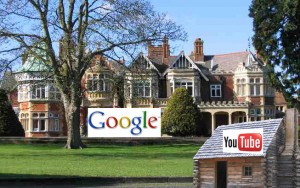You’ve seen the Ferris Bueller homage that promoted Honda during the Superbowl. Now watch Michael Broderick “then and now” as he delivers key lines in both the Superbowl ad and the film.
Be sure to check out all the advertisement’s “Easter egg” subtle nods to the film.
Tag Archives: mix
Is Google Squandering YouTube’s Potential? Yes, So…
“YouTube’s future is being held back is the typical innovator’s dilemma, or rather, billionaire’s dilemma,” writesAshkan Karbasfrooshan is CEO of WatchMojo.com. I included some of Karbashfrooshan’s pieces in Beyond Viral, and he’s one of the authoritative writers about the online-video industry and media monetization.

Indeed YouTube is but a toy kiosk in the Google “Mall of Americas.” Before I provide my 2 cents, here are some important highlights of his recent piece (with my comments in italics). His article was spawned, in part, by a “Video Forecast 2011” piece by AlphaBird’s Alex Rowland.
- Google is generating way too much money from its “traditional” search business ($30 billion) to care about radically owning the new video space (which is a small portion of the $2.5 billion Google counts as “display”).
- While YouTube commands 45% of the video streams in the U.S., it is unlikely that it will generate $600 million from video ads in 2010 (or 40% x $1.5 billion). (Hulu, he says, did $240 million… and with a tiny percentage of streams).
- YouTube correctly identified ad agencies and Fortune 500 marketers as those who would turn YouTube into a billion-dollar business. However, since Google had little experience in selling to ad agencies before it acquired YouTube, growing video revenues took a lot of time to scale.
- But instead of allowing content partners set prices based on actual market dynamics (demand and supply), YouTube implemented a set of obstacles and requirements that have made selling one’s YouTube channel all but impossible. YouTube did this, I believe, in an attempt to thwart content producers from owning the relationships with media planners and buyers. After all, if YouTube opened up its site, it would lose contact with advertisers and become a mere dumb pipe. (Indeed Google has been known to dismiss the role of the media buyer as somewhat useless intermediary… however the “dumb pipe” of Google’s paid-search network isn’t so dumb).
- Some would argue that if leading YouTube content provider Next New Networks’ indeed sold to YouTube (a rumor that spread in recent weeks, such as with this LA Times piece), it would be more of a capitulation than coup, for NNN relies so much on YouTube that it cannot possibly remain a going concern if it was not part of YouTube.
Now the WatchMojo CEO is a YouTube content provider, and has reduced the percentage of his company’s own inventory via YouTube from 45% to 15% in just the last past few months (by expanding his distribution beyond YouTube, since his YouTube audience has not contracted). He says YouTube is creating an “opening for others to win the bigger ad dollars,” and names DailyMotion, Metacafe and Facebook as potentials.
Now my thoughts: this isn’t a lone voice. I’ve heard this or similar perspective from content creators, advertising agencies, industry watch dogs and even some variations from YouTube/Google employees.
I would contend that Karbasfrooshan is more correct than controversial, and that Google is perhaps even “strategically ignoring” online-video’s near-term growth potential because it has far more critical business “levers.”
- Google has a cash cow in search-engine advertising, and is broadening into other mediums especially mobile. I expect YouTube’s growth to continue (it’s usually the case with the market leader), but its share of online-video display dollars will decline dramatically.
- Still, YouTube will continue to flourish via the middle market, lower maintenance, and “self serve” portion of the marketplace. This is almost certain without a significant “course correction” that does not appear imminent or within Google’s DNA.
- If Facebook begins to display video and share advertising revenue with content creators, I would imagine most — from Discovery to Annoying Orange — would start posting on Facebook quickly, migrating their audience, and even staggering/delaying content to YouTube (the way some providers like The Onion and College Humor do… first posting on their own sites, then weeks later posting on YouTube).
- Just as I don’t think my own content cannot survive and flourish outside YouTube (at least alone, hence my signing with Next New Networks), I do not believe Google is poised to grow or even maintain YouTube’s share of the online-video advertising budgets even remotely in relationship to its percent of video streams.
- The exception will be small companies and middle markets, or advertisers who are prone to buying via Adwords. Currently the vast majority of YouTube advertising dollars (with the exception of individual campaigns and homepage takeovers) are almost entirely driven by Adsense Adwords. You heard me correctly, and that’s a sad statement about Google/YouTube’s ability to sell direct to brands and/or via partners and agencies.
Large content creators and brands will and should want a strong platform partner which puts the audience needs and preferences first, but theirs at a close second.
So the answer to this post’s title is “yes… Google is squandering YouTube’s potential right now.” It is almost inarguable truth that YouTube is not leveraging the strength of Google and its global salesforce, and not winning the hearts and minds of Madison Avenue. It follows, therefore, that the stewards of large digital media budgets are now seeking — and will continue to pursue — alternative online-video advertising options for innovative programs beyond prerolls.
I’d expect to see AOL and Yahoo, if not Facebook, knipping away at Google’s online-video Achilles heal. Google, after all, is not a media property at heart… it’s a sleuth of engineers producing innovative change. Given that identity, Google can’t be underestimated as a bold market force that will continue to shake the online-video industry in ways far more interesting than hundred-million-dollar media buys, which are akin to vending-machine revenue at a casino.
In the meantime, content creators should:
- Ask YouTube to facilitate and encourage them to prevent agency buyers from feeling YouTube’s thorns. Likewise they need to aggregate to achieve sufficient strength to command the interest of digital buyers unless their niche is remarkable.
- Maintain good relationships with YouTube people, recognizing that many of YouTube’s shortcomings are out of their control.
- Diversify their distribution to include some of the smaller properties… especially those that grow. YouTube’s incentive to innovate for advertisers depends on market competition.
- Derive income directly via sponsorships… which is no longer discouraged by YouTube, a video platform.
- Pay close attention to what Google is doing with online video that has far greater potential than YouTube or any individual media property alone.
How & Why Madison Avenue Is Killing YouTube (and what it can do)
Call it a subtle scent at this week’s Ad:Tech in NYC… Lots of discussion of online-video, even if not in proportion to online-video’s growing importance to the online-marketing mix. More interesting, however, is that most conversations didn’t use the two words: “you” and “tube.” People talked about contextual targeting, video-advertising networks, and even facial recognition.
Even though every attendee received a free Fast Company that featured YouTube influencers, the words “You” and “Tube” weren’t muttered except in disgust. Even Google’s mainstream booth didn’t showcase YouTube. WTF?
Why? How was it that people would only discuss YouTube when I brought it up? And why was all the feedback negative:
 They’re not selling inventory well. They’re not even making it easy for us to buy it.
They’re not selling inventory well. They’re not even making it easy for us to buy it.- They don’t understand the role of the agency because they’re used to getting money through electronic bids.
- YouTube sees agencies as unimportant middlemen between them and THEIR customers
- If you don’t have $40 million, they won’t customize things for you.
The “Madison YouTube Snub” wasn’t about the proximity of ads to “consumer generated content,” or about metrics or targeting. It was simply that agency buyers (as haughty as I know they can be) aren’t being treated well.
What YouTube is missing is the “Great Irrationality of Marketing Spending,” something I’ve grown to understand even if I disdain. I’ve seen it closely from all three perspectives: as a content creator, a buyer, and an intermediary. While we direct-response oriented marketers (the ones who track A/B campaigns on Google OCD style) are about results, the vast majority of advertising spending is not rational or performance driven. There. I said it. Try to refute that fact.
I’m not suggesting that media buyers are behaving recklessly or spending without consideration of their client’s money. But I do know that when confronted with a new medium with unclear metrics, they buy based on a) what’s easy, b) what they understand, and c) relationships.
I know how devalued my 4-6 million monthly views on YouTube are, and how the cost-per-view is horrifically low. So this article is a bit biased. But I also know I can’t solve that myself… it’s going to take some improvements in San Bruno. I would typically provide this advise without public fanfare as “not to bite the hand that feeds me.” I wouldn’t have an audience without YouTube. But I owe it to myself and fellow creators to help YouTube solve its biggest problem: poor monetization of traffic.
So here are 7 tips for YouTube to win back the hearts and dollars of Madison Avenue.
 Be Nice. You don’t have to contort your business model to fit advertisers, but at least show them love.
Be Nice. You don’t have to contort your business model to fit advertisers, but at least show them love.- Know Your Customer. It’s only partially true that the big brands are your customer, Google. Don’t negate the influence of the agencies on how that spending is partitioned. Even the smartest and well-intentioned marketers defer to media buyers. Marketer have two years to chase ROI and can’t possibly get into the weeds of one medium — much less one property.
- Teach Google sales people about YouTube. They simply don’t understand how to sell display advertising, much less video. It’s really quite sad.
- Educate. As market leader, it’s Google’s responsibility to set metrics, validate the medium, and educate buyers AND key influencers. Don’t expect logic to prevail, or it will be 2012 and Madison will have jacked up competitors. If I don’t see some ROI studies in 2011 published by YouTube and Forrester, ComScore, TubeMogul, Jupiter, eMarketer, or whoever… I’m going to show up to San Bruno with poop on a stick.
- Create an East Coast sales office for YouTube. Do it now. YouTube is floundering in silly pods, and there’s not enough pretty faces greasing agency palms. I resent it too, but it’s how dollars flow.
- Decentralize. Agencies do a lot of stupid things, but they know the importance of small. Google is too layered to move in the agile way that’s required of new media, and it’s killing itself.
- Get Creative. You don’t need to accept ad units that piss of your viewers, which is a more important stakeholder than advertisers. But explore new options, partner with greater trust, and don’t expect video to be monetized with the simple standards of your cash cow (paid search).
Any other tips? Or are you just gonna hope it takes care of itself?

